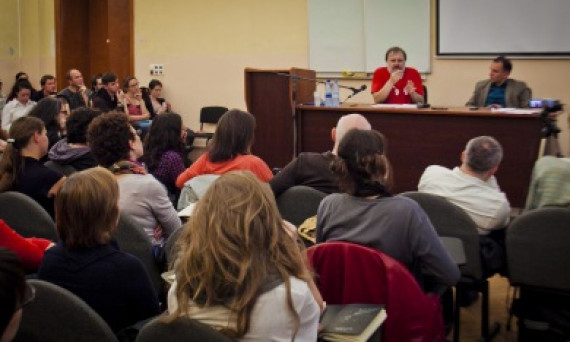Department of Political Science and Sociology and Chair of Democratic Theory presented the talks by Mladen Dolar and Slavoj Žižek in which scientists shared their reflections on the current science and society and discussed them with the leading Russian critical intellectuals.
August 22
- 17.00—19.00 Mladen Dolar (University of Ljubljana, Slovenia; Van Eyck Academy, Netherlands): WHAT, IF ANYTHING, IS AN ATOM
- 20.00 – Screening of a film by the art-group “Chto Delat”, “The Russian Forest”.
What, if anything, is an atom?
The ancient atomism was the first appearance of materialism in the history of philosophy, so the stakes in conceiving the atom, as a philosophical entity, are very high. The very fate of materialism and idealism is involved in this simple question, and hence the nature of philosophy. One could say ‘tell me what you see in the atom and I’ll tell you who you are’.
Three stories will be told. The first one is the Hegelian account of atomism, which essentially sees in it the advent of the notions of one, the void and their split. For Hegel, the great admirer of the speculative insight of ancient atomism, its great merit was to introduce ‘one’ by submitting being to count and to a split. For Hegel, the indivisible particle is not the atom, but what is indivisible is ultimately the division itself, the driving force of negativity inscribed in any entity.
The second story is that of clinamen, the notion introduced into atomism by Epicurus (and expounded by Lucretius), which is the story of a contingent swerve which befalls the atoms, and hence something that inherently departs and undermines ‘the one and the void’. The clinamen story was much criticized and ridiculed by the great philosophical tradition, including by Hegel. Very young Karl Marx stood up for the crucial value of clinamen (in his dissertation on the philosophy of nature in Democritus and Epicurus), and on his tracks in recent times Louis Althusser and Gilles Deleuze.
The third story is that of den, a curious neologism introduced by Democritus, which perhaps undermines both stories at the outset. For if atom is den, then it is not a body, not an entity, not one, not being, but also not non-being. It is a paradoxical departure from the bulk of ontology, an ontological scandal, obfuscated by the subsequent Aristotelian paradigm. Jacques Lacan took it up as a clue to his notion of the object, the object of psychoanalysis, and so did, curiously and in a different vein, Samuel Beckett.
Do the three stories add up, can one make a single story out of them? Curiously, answering the question ‘what, if anything, is an atom?’ still very much stands at the core of contemporary theoretical battles and engagements.
August 23
- 16.00–19.00 – Slavoj Žižek (Birckbeck University, UK, Society for Theoretical psychoanalysis, Ljubljana, Slovenia): WELCOME TO THE DESERT OF POST-IDEOLOGY
- 19.30-21.30 IS THERE A REASON IN HISTORY? STATE AND REVOLUTION TODAY. Panel discussion.
Participants: Artemy Magun, Alexey Penzin, Alexander Skidan, Oxana Timofeeva, Dmitry Vilensky (all – group “Chto Delat”), Keti Chukhrov (SCCA, Moscow), Mladen Dolar, Slavoj Žižek.























